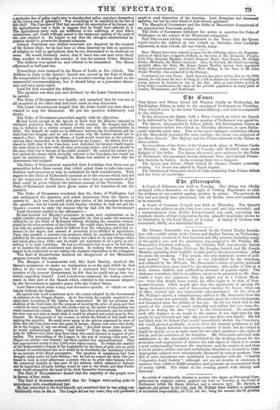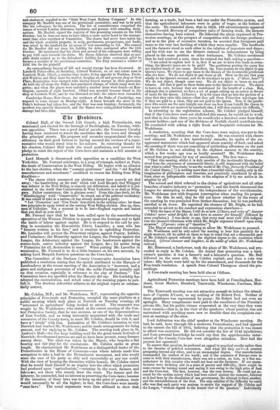21Lbt Sfiltttopolis.
A Court of Aldermen was held on Tuesday. The sitting was wholly occupied with a discussion on the right of Visiting Magistrates to take the evidence of one convict against another in prison. The power to do this had previously been questioned, but all doubts were now considered to be removed.
A Court of Common Council was held on Thursday. The Queen's answer to the address on the Corn-laws was read and duly recorded; and a communication from Dublin Town-Council was read, conveying the emphatic thanks of that Corporation for the splendid hospitality shown to its deputation by the Lord Mayor of London. A variety of business was transacted, chiefly of a ministerial kind.
Mr. Thomas Duncombe was honoured by the United Trades Associa- tion with a public soirée, at the Crown and Anchor Tavern, on Wednesday.. The company consisted of four hundred and fifty persons, including many of the gentler sex; and the presidency was assigned to Mr. Wakley, Mr. Duncombe's Finsbury colleague. Mr. Christie, M.P., was present: letters were read from Mr. Charles Dickens, Mr. Douglas Jerrold, and Mr. Joseph Mazzini, regretting their inability to take part in the demonstration. After tea came the speaking. " The people, the only legitimate source of poli- tical power," was the first toast: it was introduced by the chairman, and enforced by Mr. M'Grath. Mr. Duncombe's claims to public gratitude and confidence were next stated by the chairman; who spoke of him as a bold, sincere, faithful, and unflinching advocate of popular rights. The chairman remarked, that in an address about to be presented to Mr. Dun- combe a hope was expressed that he might yet be a Cabinet Minis ter: when that should come round, his office ought to be that of Post- master-General; which would give him the opportunity of opening Sir James Graham's letters, and of discovering whether Sir James, when out of office, entered into any treasonable correspondence! At the close of Mr. Wakley's speech, a complimentary address to Mr. Duncombe from the working classes was presented. Mr. Duncombe made his acknowledgments, and descanted upon the politics of the day. He did not think that in the annals of the country so much imbecility and trifling had ever been dis- played as during the late crisis " in the Government. He considered such silly displays as an insult to the nation: it was high time for the people to step forward and take the power into their own hands! He did not think that Sir Robert Peel would immediately abolish the Corn-laws, but would proceed gradually, so as to allow the country gentlemen to fall quietly. Repeal, however, was merely a matter of time: but he wished it might be speedy, so as to make room for two other questions—the rights of labour, and the extension of the franchise. Mr. Duncombe adverted with satisfaction to the Association established by the working classes for the protection and employment of labour; the real object of which is to create a good understanding between the employers and the employed, and thus to avert aimless strikes and such unfortunate disorders as occurred in 1842. Appropriate subjects were subsequently discussed by various speakers. One fact of some importance was mentioned in connexion with the " Chartist Cooperative Land Society ": although not yet six months in existence, it numbers from 5,000 to 6,000 members, and possesses an accumulated fund of nearly 5,0001. The whole of the evening passed with hilarity and harmony.
An action of considerable interest to persons who figure as Provisional Ccen- mitteernen on exploded railway projects was tried on 'Tuesday, at the Court of Exchequer, before Mr. Baron Alderson and a common jury. Mr. Barnett, a stationer and minter in the City, sued Mr. William Jones Burdett, a gentleman of undoubted respectability, for 1721. 10s. 6d.; being the amount due for printing
and stationery supplied to the "Irish West Coast Railway Company." In this company Mr. Burdett was one of the provisional committee; and was to be paid, like his colleagues, for his services. The list of committeemen comprised the names of several London Aldermen, barristers, and persons with sounding desig- nations. Mr. Burdett signed the registry of this promising concern on the 16th October; but he does not seem to have taken a more active hand in the manage- ment than other members of Committee. The shares had never been taken up; and the whole available property, in scrip, parchments, prospectuses, and books, was seized by the landlord for an arrear of rent amounting to 151. The counsel for Mr. Burdett did not deny his liability for debts contracted after the 16th October. He mentioned that his client and several of his colleagues were willing to pay 1501. each towards the debts. Mr. Baron Alderson observed that no pos- sible doubt existed as to the defendant's liability for debts contracted after he became a member of the provisional committee. The Jury returned a verdict of 119/. 10s. for the plaintiff.
An extraordinary forgery of bill and receipt stamps has been discovered. At Lambeth Police-office, on Saturday, Edward Watkins, an oil and colour man in Lambeth Walk, 011ard, a marine-store dealer, living opposite to Watkins, Frede- rick Watkins and Mary Anne his mother, keeping an oil and grocery shop at Oval Place, Kennington, were charged with having forged stamps in their possession. At both the oil-shops the Police had purchased stamps, of which many were for- geries; and when the places were searched a number more were found—at Ken- nington, upwards of eight hundred. 011ard was arrested because found in the shop at Lambeth Walk, and he was liberated on bail; the others were remanded.
Cambridge House, Kew Green, the residence of the Duke of Cambridge, was exposed to some danger on Monday night. A beam beneath the stove in the Duke's bedroom had taken fire, and the floor was soon burning: fortunately, the accident was speedily discovered, and the flames were extinguished before much damage had been done.



























 Previous page
Previous page